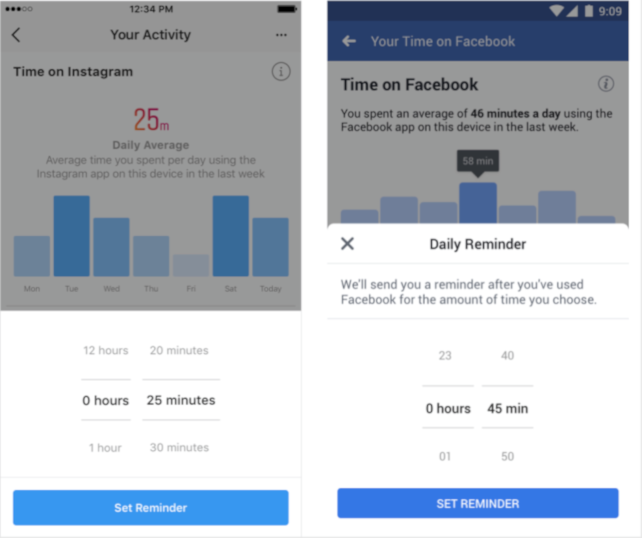 Internet users spend an average of 135 minutes per day on social media. For many, it’s become our morning wake up ritual, daily commuting habit and before bedtime routine. Not to mention all those checkups in between.
Internet users spend an average of 135 minutes per day on social media. For many, it’s become our morning wake up ritual, daily commuting habit and before bedtime routine. Not to mention all those checkups in between.
Now Facebook and Instagram are giving us a chance to see what this really adds up to. New screen-time management dashboards have started to appear for users in the US and will be rolled out over the coming weeks. The feature will show users how much time they have spent on the app (desktop time not included) and alerts can be set to self-regulate use.
This attempt at tackling the issue of digital well-being follows Instagram’s ‘You’re all caught up’ message. Instagram’s CEO Kevin Systrom tweeted back in June: “We’re building tools that will help the IG community know more about the time they spend on Instagram – any time should be positive and intentional”, adding, “We want to be part of the solution. I take that responsibility seriously.”
‘Positive and intentional’ are words not often associated with social media. A constant need to check in has left many of us hooked in ‘compulsion loops’. The creators of the ‘like’ button have admitted they knew that these digital compliments would trigger our dopamine level. This admiration and validation feel good because you’re experiencing a chemical rush. But the overuse as a result has been linked to everything from reduced productivity and low self-esteem to declined social skills.
Most of us will recognize this habitual use and that regretful feeling as you snap out of a social media haze – realizing that instead of chatting to a loved one or tackling that pile of washing, you’ve spent half an hour staring at memes. Research agrees, we’ve turned into a generation of zombie scrollers.
For all its shortcomings, social media offers myriad benefits and it’s these Facebook wants to shift focus to. Last year, their ‘Hard Questions: Is Spending Time on Social Media Bad for Us?’ blog post concluded that it was passive use that was damaging, and the key was to engage. “We want Facebook to be a place for meaningful interactions with your friends and family — enhancing your relationships offline, not detracting from them.”

Their commitment to this responsibility has seen Facebook co-opt the ‘Time Well Spent’ non-profit initiative that ex-Google employee and Facebook critic Tristan Harris set up back in 2016. Since, they have released several updates aimed at enhancing user experience. Demoting news and brands in the news feed in favor of posts from your friends, a ‘snooze’ option to mute people for 30 days (those you can’t stand but don’t dare unfriend) and ‘take a break’ – a similar thing, but for exes.
This focus aims to create a middle ground between overuse and eschewing social altogether. ‘Digital detoxes’ have been on the rise recently, as have old-school phone downgrades. When Nokia relaunched the classic 3320 it received ‘unprecedented’ demand. Apparently even Rihanna has a flip phone.
This middle ground will look different for everyone, but it’s essential we all find a balance that we are comfortable with. Social media isn’t going anywhere and the majority of us benefit from it socially or professionally. It’s important we find a way to have it as part of our lives in a healthy way, particularly with the explosion of virtual reality imminent. Even with these new screen time management tools, the onus is on us to manage our own time. You can set yourself a limit, but the app won’t disable once you reach it.
Since my influencer marketing business model depends on social use, my support of such an initiative could be counterintuitive as Facebook’s, but it’s something we’re looking to educate our influencers on in the near future. Not all social usage is created equally and it’s the responsibility of everyone involved in the industry to encourage a more mindful, lean-in approach over passive usage.
Taking a proactive approach is key. Using the platforms to make meaningful connections with friends and family, following people who inspire you and joining groups of likeminded hobbyists remind us why we joined these platforms in the first place. A colleague of mine has taken the advice of many digital wellness experts by banning all digital devices from the bedroom. Instead investing in an alarm clock to wake him up in the morning, rather than a phone and mindless scroll. It’s these disciplines, and new features, that will ensure our time is well spent and remind us when to put our phones away, even if it is #brunchgoals.




